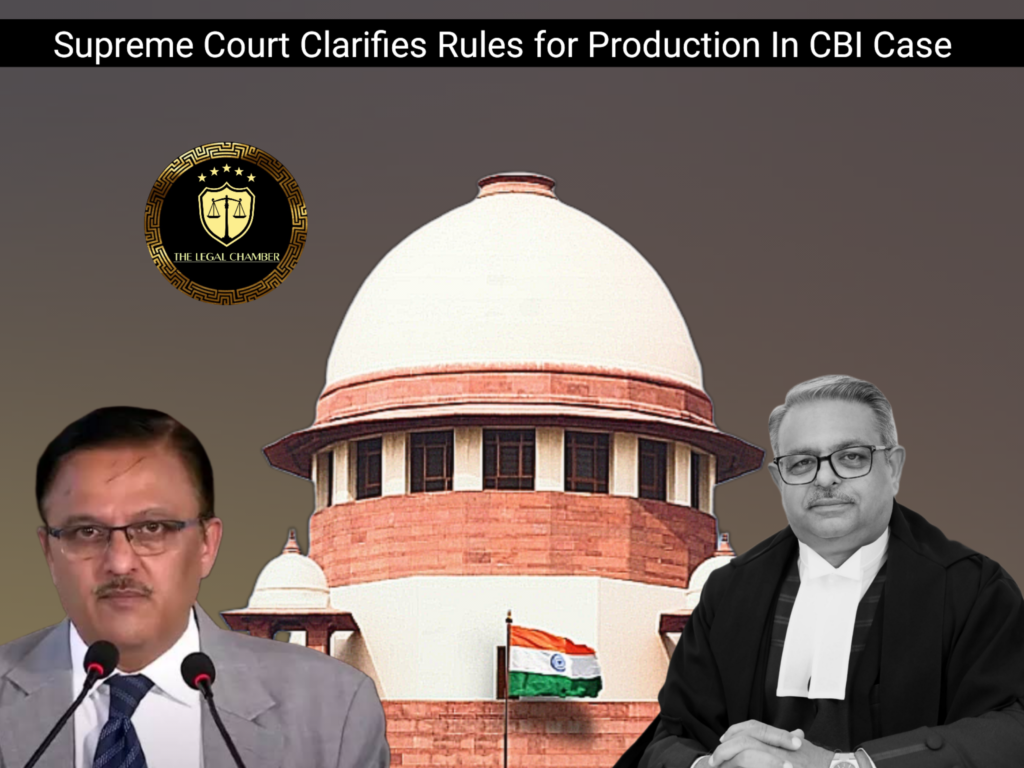
The Supreme Court upheld that additional documents can be produced by the prosecution even after the charge sheet is filed, especially if inadvertently omitted. The Court reiterated that Section 173(5) of the CrPC is directory, not mandatory, and permits the production of documents gathered before or after investigation with court permission. The judgment clarifies that the authenticity of such documents remains an open issue to be proved during trial.
Facts Of The Case:
An FIR was registered on May 3, 2013, for offences under the IPC and the PC Act. The dispute involves two Compact Discs (CDs). Between January 8, 2013, and May 1, 2013, the Ministry of Home Affairs permitted the interception of telephone calls of several accused and one Manoj Garg. On May 4 and May 10, 2013, two CDs containing call records were seized. These CDs were sent to the Central Forensic Science Laboratory (CFSL) for analysis on May 27, 2013. Sanction under Section 19 of the PC Act was granted on July 2, 2013, and a charge sheet was filed the same day. Cognizance of the offences was taken on July 4, 2013.The CFSL report and original sealed CDs were returned to the CBI on October 25, 2013. A supplementary charge sheet was filed on October 30, 2013, along with the CFSL report, but the CDs were inadvertently not filed. Charges were framed on March 11, 2014, and prosecution evidence commenced on September 15, 2014. On September 16, 2014, during PW-3’s evidence, the prosecution sought to play the unfiled CDs, leading to an objection from the defense. The CBI filed an application to prepare copies of the CDs on September 17, 2014, which was allowed by the Special Judge on September 27, 2014. This order was challenged and subsequently set aside by the Delhi High Court, which directed the Special Court to allow the CBI to file an application to bring the CDs on record.
Procedural History:
On September 16, 2014, while recording PW-3’s evidence, the prosecution sought to play CDs not yet filed, prompting a defense objection. The CBI then applied on September 17, 2014, to prepare CD copies. The Special Judge allowed this on September 27, 2014. The appellant, unheard, filed a quashing petition, which the Delhi High Court granted on May 12, 2015, setting aside the order and directing the CBI to formally apply to bring the CDs on record.The CBI subsequently filed an application under Section 173(5) CrPC. On October 13, 2015, the Special Judge ordered the CDs to be played and compared. An opposing application by the accused was rejected on October 31, 2015. The appellant challenged these orders, and on November 6, 2015, the Delhi High Court set them aside, directing the Special Court to first rule on the CBI’s application for CD production. On February 6, 2016, the Special Judge allowed the CBI to place the CDs on record. The appellant’s challenge to this order was dismissed by the Delhi High Court on April 26, 2017
READ ALSO :From Life Imprisonment to Freedom: Supreme Court Cites “Misreading of Evidence” in Acquittal
Court Observation:
The Supreme Court noted that the CDs were seized on May 4 and 10, 2013, and sent to the CFSL on May 27, 2013. When the first charge sheet was filed on July 2, 2013, the CFSL report was not yet received. The CFSL report was subsequently received on October 25, 2013, and a supplementary charge sheet was filed on October 30, 2013, incorporating the report and referring to the seized CDs and voice samples. Along with this, a Section 65B certificate under the Indian Evidence Act, 1872, was also produced.The Court emphasized that the CDs were not new articles when sought to be produced, as they were already referred to in the supplementary charge sheet. The omission to produce them initially was merely an inadvertent error by the CBI. Therefore, applying the precedent from R.S. Pai , the Special Court’s and High Court’s decisions to allow production of the CDs were deemed correct and did not warrant reconsideration. The Court clarified that the High Court should not have delved into the authenticity of the CDs at this stage, as that remains an issue for the prosecution to prove during trial, leaving open questions regarding the CDs’ authenticity and the validity of the Section 65B certificate
Final Decision & Judgement:
The Supreme Court dismissed the appeals, upholding the impugned judgment of the Delhi High Court. The Court found no fault with the High Court’s decision to allow the production of the CDs, particularly as they were referred to in the supplementary charge sheet and their initial non-production was an inadvertent omission. The Supreme Court specifically stated that the decision in R.S. Pai does not require reconsideration. However, the Court clarified that the High Court’s observations regarding the authenticity of the CDs and the legality of the Section 65B Certificate were premature. These issues, including whether the produced CDs were the same as those seized and the validity of the Section 65B Certificate, are left open for determination during the trial. Furthermore, the appellant is granted the liberty to recall prosecution witnesses for cross-examination on the limited aspect of the CDs
Case Details:
Case Title: Sameer Sandhir versus Central Bureau of Investigation Citation: 2025 INSC 776 Criminal Appeal Nos.: 4718-4719 of 2024 Date of Judgment: May 23, 2025 Judges/Justice Name: Abhay S. Oka, . and Augustine George Masih
Download The Judgement Here